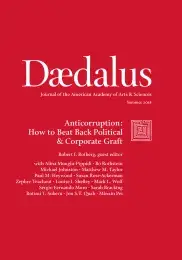Corruption & Illicit Trade
Illicit trade in diverse commodities–including drugs, people, natural resources, and counterfeit goods–is a significant component of the global economy. And illicit trade could not be possible without both high- and low-level forms of corruption. Transnational corruption has facilitated the global growth of illicit trade, undermining governance, the economy, health, social order, and sustainability in all regions of the world. This essay explores the convergences of corruption, illicit trade markets, and the legitimate economy, and identifies strategies for combatting them.
Corruption is a key facilitator of illicit trade. Because of corruption–both low- and high-level corruption1 –protected timber can be logged and traded; humans, drugs, and arms can be smuggled; and illicit goods can be transported across borders without payment of duty. When perpetrators are caught, the payment of bribes can ensure their release or minimize their sentences. This impunity contributes to the growth of illegal activity.
Illicit trade facilitated by corruption is always disturbing; together, these markets produce a more serious composite effect. The corruption associated with illicit trade drives many of the most destabilizing phenomena in the world: the perpetuation of deadly conflicts, the proliferation of the arms and weapons trade, and the propagation of environmental degradation. In the developing world, where corruption is more pervasive and states are weaker, illicit trade is like “termites at work.”2 But corruption also contributes to the growth of illicit trade in the developed world by stimulating demand for illicit goods and enriching “legitimate” corporations. And as the trade of goods moves into virtual/online marketplaces, corruption follows into cyberspace.
Global illicit trade both undermines the state and creates enormous resources for nonstate actors. . . .
